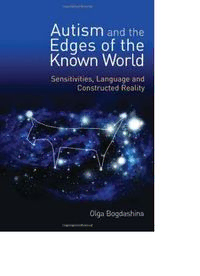
Autism and the Edges of the Known World - O. Bogdashina (Jessica Kingsley, 2010) WW PDF
Preview Autism and the Edges of the Known World - O. Bogdashina (Jessica Kingsley, 2010) WW
Autism and the Edges of the Known World by the same author Sensory Perceptual Issues in Autism and Asperger Syndrome Different Sensory Experiences – Different Perceptual Worlds Forewords by Wendy Lawson and Theo Peeters ISBN 978 1 84310 166 6 Communication Issues in Autism and Asperger Syndrome Do We Speak the Same Language? ISBN 978 1 84310 267 0 Theory of Mind and the Triad of Perspectives on Autism and Asperger Syndrome A View from the Bridge ISBN 978 1 84310 361 5 Autism and the Edges of the Known World Sensitivities, Language and Constructed Reality Olga Bogdashina Foreword by Theo Peeters Jessica Kingsley Publishers London and Philadelphia First published in 2010 by Jessica Kingsley Publishers 116 Pentonville Road London N1 9JB, UK and 400 Market Street, Suite 400 Philadelphia, PA 19106, USA www.jkp.com Copyright © Olga Bogdashina 2010 Foreword copyright © Theo Peeters 2010 All rights reserved. No part of this publication may be reproduced in any material form (including photocopying or storing it in any medium by electronic means and whether or not transiently or incidentally to some other use of this publication) without the written permission of the copyright owner except in accordance with the provisions of the Copyright, Designs and Patents Act 1988 or under the terms of a licence issued by the Copyright Licensing Agency Ltd, Saffron House, 6–10 Kirby Street, London EC1N 8TS. Applications for the copyright owner’s written permission to reproduce any part of this publication should be addressed to the publisher. Warning: The doing of an unauthorised act in relation to a copyright work may result in both a civil claim for damages and criminal prosecution. Library of Congress Cataloging in Publication Data A CIP catalog record for this book is available from the Library of Congress British Library Cataloguing in Publication Data A CIP catalogue record for this book is available from the British Library ISBN 978 1 84905 042 5 ISBN pdf eBook 978 0 85700 239 6 Printed and bound in the United States by Thomson-Shore, 7300 Joy Road, Dexter, MI 48130 To my children Alyosha and Olesya ACKNOWLEDGEMENTS The largest debt of gratitude goes to the autistic individuals who are willing to share their experiences and ideas in order to help us all learn about the diversity of human thinking and ways to perceive the world around us. I’m most grateful to Manuel Casanova, Gottfried and Gisela Kolb Endowed Chair in Psychiatry, Associate Chair for Research, University of Louisville, and Professor Geoffrey Samuel, Director of the Cardiff Humanities Research Institute and Professorial Fellow in the School of Religious and Theological Studies, Cardiff University, both of whose critical comments and supportive recommendations enabled me to improve this book. As with all projects, there are ideas and issues in this book that are likely to be modified or corrected when new facts, research findings and observations come to light. My warmest thanks go to Ian Wilson, a brilliant artist working with adults with autism, who kindly drew the pictures for this book. This book would not have been written if it were not for my children (who are young adults now) – Alyosha and Olesya. Without them I wouldn’t have been the ‘me’ I am now. Thanks also due to Nigel for his patience and tolerance of my working schedule, and to my three very special friends and companions, Dasha, Lucy and Peter, whose emotional support throughout the project was invaluable. Last but not least, I’d love to thank my publisher, Jessica Kingsley, and all the staff at JKP who were very supportive of this project. This book benefited greatly from the skills of my production editor, Victoria Peters, and copyeditor, Amy Lankester-Owen. However, the shortcomings, whatever they may be, remain my responsibility. CONTENTS Foreword 9 Introduction 13 1. Sensory Realities 17 2. Filtering Model 29 3. Side-Notes: A Few Questions to Ask 45 4. Gestalt Perception 53 5. Sensory Perceptual Development 67 6. Hidden Agenda of Language 93 7. Non-Verbal Communication 133 8. Sensory Hypersensitivities 165 9. Side-Notes: Before We Go Further 173 10. Extrasensory Realities in Autism (With Possible Explanations) 187 AFTERWORD 197 REFERENCES 200 SUBJECT INDEX 219 AUTHOR INDEX 222 / 9 FOREWORD If we could but understand one single flower we might know who we are and what the world is. (J.L. Borges) When I read Olga’s manuscript I immediately thought of Alvarez’s foreword to his book, The Savage God (1972). Since ‘traditional science’ has the tendency to study phenomena in mono (looking at things from one angle only), he tried to study suicide in literature, because, as Pavese said, literature is a science of life, the one that studies a phenomenon from different angles. This is precisely what Olga Bogdashina attempts to do here. Her Sensory and Perceptual Issues in Autism and Asperger Syndrome: Different Sensory Experiences – Different Perceptual Worlds (2003) was an eye opener. In this new book she goes much further in her analysis, hypotheses and suggestions relating to the consequences of the ‘qualitatively different sensory and perceptual differences’ in autism spectrum conditions. If, from the very beginning, individuals with autism have a different sensory and perceptual development, then it is only logical to admit that they may have different experiences, concepts, intuitions or dreams… that they live in a reality that is different from ours in several ways. Don’t they have the right to their own reality? Olga tries to push the boundaries and explore ‘the edges of our knowledge’, describing aspects of autism for which there are (until now) no rational explanations, but which have often been
